Special Feast Days
 |
 |
 |
 |
 |
 |
 |
All Souls Day – November 2
All Souls Day has great significance for us. It is the day when we pray for all the faithful and all the souls who have died and possibly are in Purgatory. It is also the day when the Church – with the tact proper to her – reminds us of the reality of death.
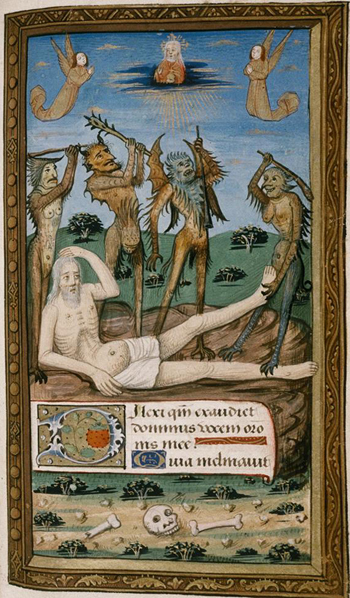 On the one side, the Church points to a cliff under our feet and makes us see a multitude of souls who are in a state of punishment and suffering. On the other, she shows us the misery of death, its destruction of the body and the misery of the soul that does not go straight to Heaven.
On the one side, the Church points to a cliff under our feet and makes us see a multitude of souls who are in a state of punishment and suffering. On the other, she shows us the misery of death, its destruction of the body and the misery of the soul that does not go straight to Heaven.
It would be beautiful to see in the All Souls Day's liturgy some phrases of Job, the lamentations of a man on the edge of madness who falls into the jaws of death, entirely isolated, with his bones calcinated, his flesh reduced to dust and the bitter weeping that inundates the soul separated from the body. It would be good to see reminded in the liturgy the misery of that sinner installed in a place of punishment awaiting God's mercy, the mercy of the living God.
Once in a while we should meditate on death to understand what is profoundly real in the warning the priest makes to each one of us on Ash Wednesday: "Remember, man, dust thou art, and to dust thou shalt return."
This gives us an understanding of the real dimension of all things in this life.
There are persons who imagine that they will always have some time left to prepare for death; that they will have a long disease that will slowly wear away their health until they die. So, when they feel healthy they have a relative security that they will not die suddenly.
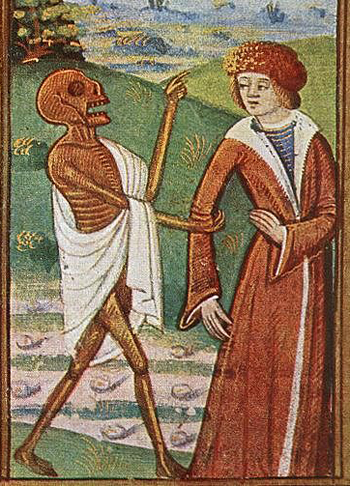 This is not true. We can die suddenly either in an accident or from one of those medical conditions that are unpredicted and medicine can only explained after they happen. At any moment we can die.
This is not true. We can die suddenly either in an accident or from one of those medical conditions that are unpredicted and medicine can only explained after they happen. At any moment we can die.
If any of us can die at any moment, all our desires and actions in this life appear as worthless. We will die and end in the cemetery.
A meditation on death is a good way to create detachment from the things of this earth; it humiliates our pride and makes us understand that in a single moment we may die and appear before the judgment seat of God.
Who among us knows whether he reach home alive this evening? Who knows whether in one hour he will be before the judgment seat of God? Who can be certain that he will not be burning today in the flames of Purgatory or Hell?
Without this uncertainty about death, life has no grandeur. Nothing is beautiful, nothing is attractive without the figure of death at the end of the road. Because it is only by contrast that man evaluates the transitory nature of things in this life; it is only by contrasting life with this fundamental misery that we comprehend how everything we want here is small in the face of the destiny that awaits us, which is death.
The modern mindset abhors grief
This is why the progressivists want to do away with everything in the liturgy that represents death. I knew one of them who advocated the use of white vestments for mourning, explaining: "It is a day of joy! The person goes to Heaven and the family should be glad…"
This type of progressivist does not want to wear black vestments because he is afraid of thinking about death since his conscience is not at peace.
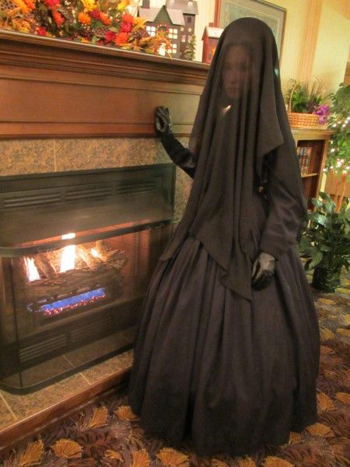 In times past, some widows used to wear black clothing from head to foot. They would even cover their faces with a black transparent veil during the period of heavy or deep mourning. Only when they went to visit persons to thank them for the condolences received did they lift their veils to converse a bit. But they covered their faces again when they left to return to their homes.
In times past, some widows used to wear black clothing from head to foot. They would even cover their faces with a black transparent veil during the period of heavy or deep mourning. Only when they went to visit persons to thank them for the condolences received did they lift their veils to converse a bit. But they covered their faces again when they left to return to their homes.
There was also what was called "light mourning," which consisted in dressing in black and white. This mourning was adopted either by distant relatives or by close relatives after a certain period of time. Only after one or two years did the mourning period end.
The Revolution abhors grief. We should face death with serenity and grandeur, confronting even what it has of the afflictive and tremendous.
The intelligent being has such grandeur that, in the face of the catastrophe of death, man has the certainty that another life and another destiny await him.
The consideration of death is beneficial; the consideration of suffering is also beneficial. Sometimes I have the desire to take you on a short tour and bring you to a hospital to see some seriously ill people – a man with cancer, another with a grievous ulcer on his arm – so that you can comprehend the role of suffering in life. We cannot have a life of a porcelain doll, ignoring suffering and lacking the courage to see it face-to-face.
The book of Job has some texts that are magnificent descriptions of sorrows. I have never seen as much majesty in sorrow as I have seen in the book of Job. If Our Lord said that Solomon in his glory was not adorned like the lilies of the fields, then I believe we can also say that Louis XIV in all his splendor did not have the majesty of Job in his suffering. The lamentations of Job number among the most majestic things that exist on this earth.
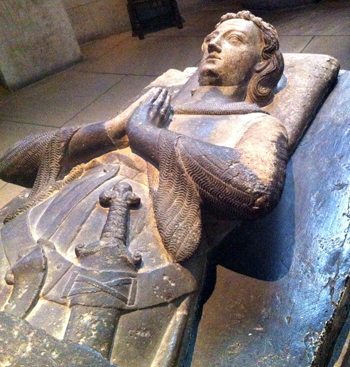 These are some lessons to draw from All Souls Day. These are the lessons on death that the deceased give us. Lessons of incomparable profundity, strength of soul, courage and grandeur.
These are some lessons to draw from All Souls Day. These are the lessons on death that the deceased give us. Lessons of incomparable profundity, strength of soul, courage and grandeur.
Journalists of a bygone era used to report the death of people with greater insight: "Finally, he expired and the majesty of death clothed him with its features." It is a very beautiful idea.
There is majesty in death and principally in dead persons who assume some of the majesty of the punitive God. It is the majesty of thunder and lightning, of earthquakes and cataclysms; it is something that it is necessary to know and love. Because whoever does not know and love this majesty is not capable of seeing God in His entirety: in His infinite affability but also in His eternal justice.
Let us pray for the deceased, for the souls who are the most abandoned in Purgatory and for whom no one prays, with the consent of Our Lady, of course, who decides what to do with all our prayers. Let us also ask that they obtain for us the comprehension, love and enthusiasm for those unfathomable shadows of death that enrich the aesthetics of the universe and the authentic panoramas of human life.
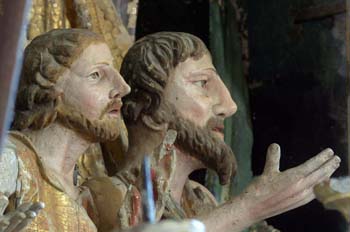


The Saint of the Day features highlights from the lives of saints based on comments made by the late Prof. Plinio Corrêa de Oliveira. Following the example of St. John Bosco who used to make similar talks for the boys of his College, each evening it was Prof. Plinio’s custom to make a short commentary on the lives of the next day’s saint in a meeting for youth in order to encourage them in the practice of virtue and love for the Catholic Church. TIA thought that its readers could profit from these valuable commentaries.
The texts of both the biographical data and the comments come from personal notes taken by Atila S. Guimarães from 1964 to 1995. Given the fact that the source is a personal notebook, it is possible that at times the biographic notes transcribed here will not rigorously follow the original text read by Prof. Plinio. The commentaries have also been adapted and translated for TIA’s site.

Job suffered every torment
It would be beautiful to see in the All Souls Day's liturgy some phrases of Job, the lamentations of a man on the edge of madness who falls into the jaws of death, entirely isolated, with his bones calcinated, his flesh reduced to dust and the bitter weeping that inundates the soul separated from the body. It would be good to see reminded in the liturgy the misery of that sinner installed in a place of punishment awaiting God's mercy, the mercy of the living God.
Once in a while we should meditate on death to understand what is profoundly real in the warning the priest makes to each one of us on Ash Wednesday: "Remember, man, dust thou art, and to dust thou shalt return."
This gives us an understanding of the real dimension of all things in this life.
There are persons who imagine that they will always have some time left to prepare for death; that they will have a long disease that will slowly wear away their health until they die. So, when they feel healthy they have a relative security that they will not die suddenly.

A medieval maxim: Memento mori - Remember death
If any of us can die at any moment, all our desires and actions in this life appear as worthless. We will die and end in the cemetery.
A meditation on death is a good way to create detachment from the things of this earth; it humiliates our pride and makes us understand that in a single moment we may die and appear before the judgment seat of God.
Who among us knows whether he reach home alive this evening? Who knows whether in one hour he will be before the judgment seat of God? Who can be certain that he will not be burning today in the flames of Purgatory or Hell?
Without this uncertainty about death, life has no grandeur. Nothing is beautiful, nothing is attractive without the figure of death at the end of the road. Because it is only by contrast that man evaluates the transitory nature of things in this life; it is only by contrasting life with this fundamental misery that we comprehend how everything we want here is small in the face of the destiny that awaits us, which is death.
The modern mindset abhors grief
This is why the progressivists want to do away with everything in the liturgy that represents death. I knew one of them who advocated the use of white vestments for mourning, explaining: "It is a day of joy! The person goes to Heaven and the family should be glad…"
This type of progressivist does not want to wear black vestments because he is afraid of thinking about death since his conscience is not at peace.

A lady in deep mourning in colonial New England
There was also what was called "light mourning," which consisted in dressing in black and white. This mourning was adopted either by distant relatives or by close relatives after a certain period of time. Only after one or two years did the mourning period end.
The Revolution abhors grief. We should face death with serenity and grandeur, confronting even what it has of the afflictive and tremendous.
The intelligent being has such grandeur that, in the face of the catastrophe of death, man has the certainty that another life and another destiny await him.
The consideration of death is beneficial; the consideration of suffering is also beneficial. Sometimes I have the desire to take you on a short tour and bring you to a hospital to see some seriously ill people – a man with cancer, another with a grievous ulcer on his arm – so that you can comprehend the role of suffering in life. We cannot have a life of a porcelain doll, ignoring suffering and lacking the courage to see it face-to-face.
The book of Job has some texts that are magnificent descriptions of sorrows. I have never seen as much majesty in sorrow as I have seen in the book of Job. If Our Lord said that Solomon in his glory was not adorned like the lilies of the fields, then I believe we can also say that Louis XIV in all his splendor did not have the majesty of Job in his suffering. The lamentations of Job number among the most majestic things that exist on this earth.

The grandeur & sacrality of death
Journalists of a bygone era used to report the death of people with greater insight: "Finally, he expired and the majesty of death clothed him with its features." It is a very beautiful idea.
There is majesty in death and principally in dead persons who assume some of the majesty of the punitive God. It is the majesty of thunder and lightning, of earthquakes and cataclysms; it is something that it is necessary to know and love. Because whoever does not know and love this majesty is not capable of seeing God in His entirety: in His infinite affability but also in His eternal justice.
Let us pray for the deceased, for the souls who are the most abandoned in Purgatory and for whom no one prays, with the consent of Our Lady, of course, who decides what to do with all our prayers. Let us also ask that they obtain for us the comprehension, love and enthusiasm for those unfathomable shadows of death that enrich the aesthetics of the universe and the authentic panoramas of human life.

The Souls in Purgatory await our prayers

 | |
|
|
The texts of both the biographical data and the comments come from personal notes taken by Atila S. Guimarães from 1964 to 1995. Given the fact that the source is a personal notebook, it is possible that at times the biographic notes transcribed here will not rigorously follow the original text read by Prof. Plinio. The commentaries have also been adapted and translated for TIA’s site.


